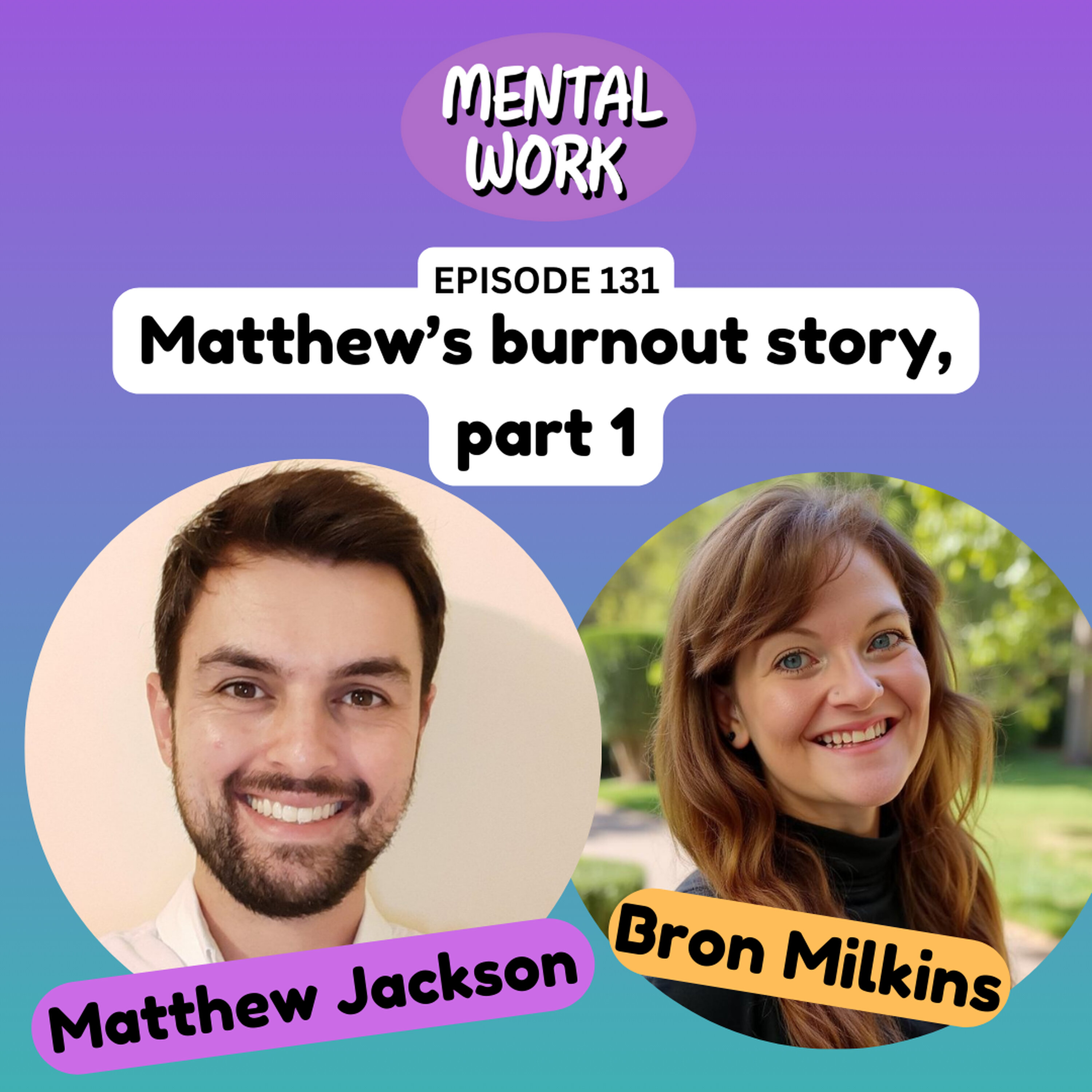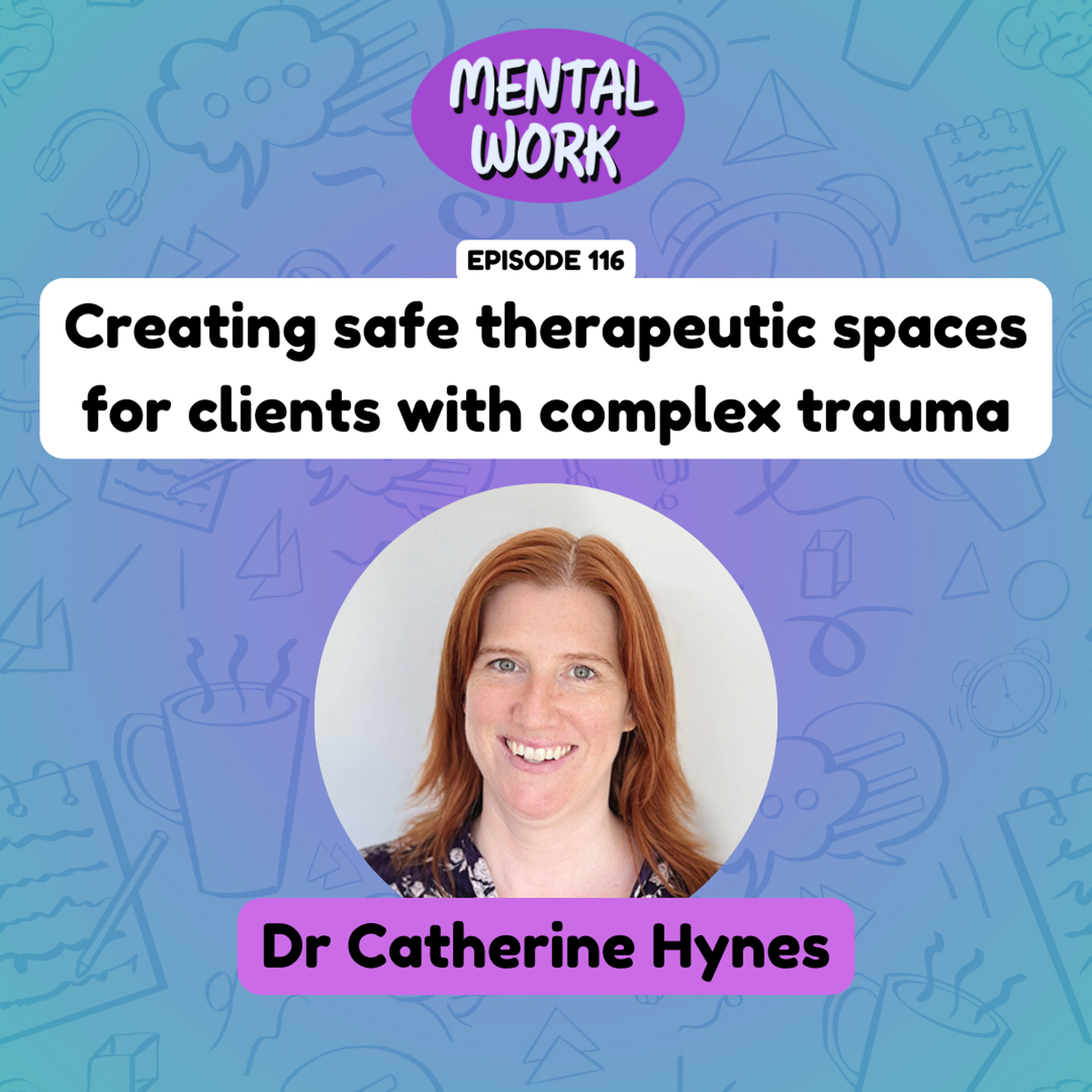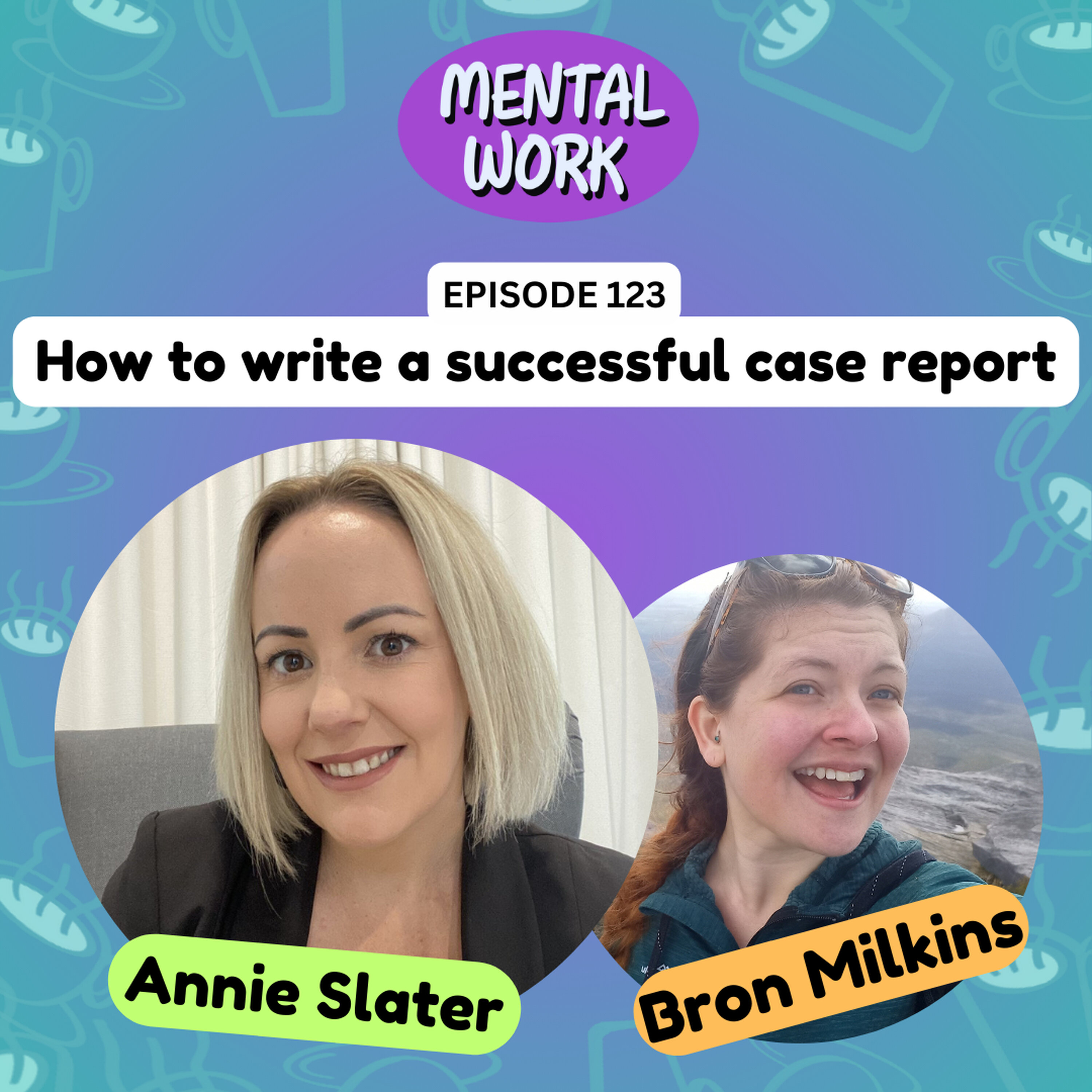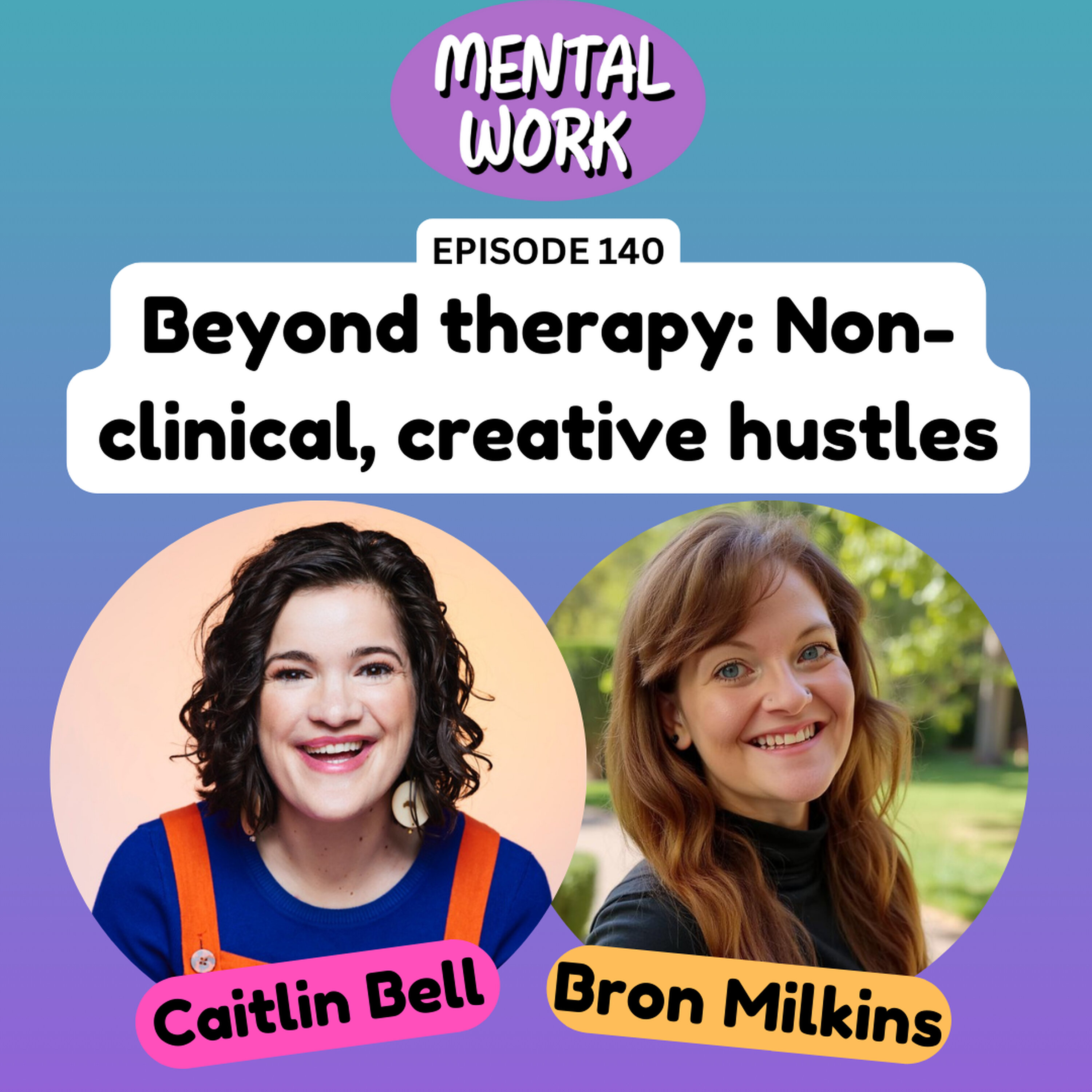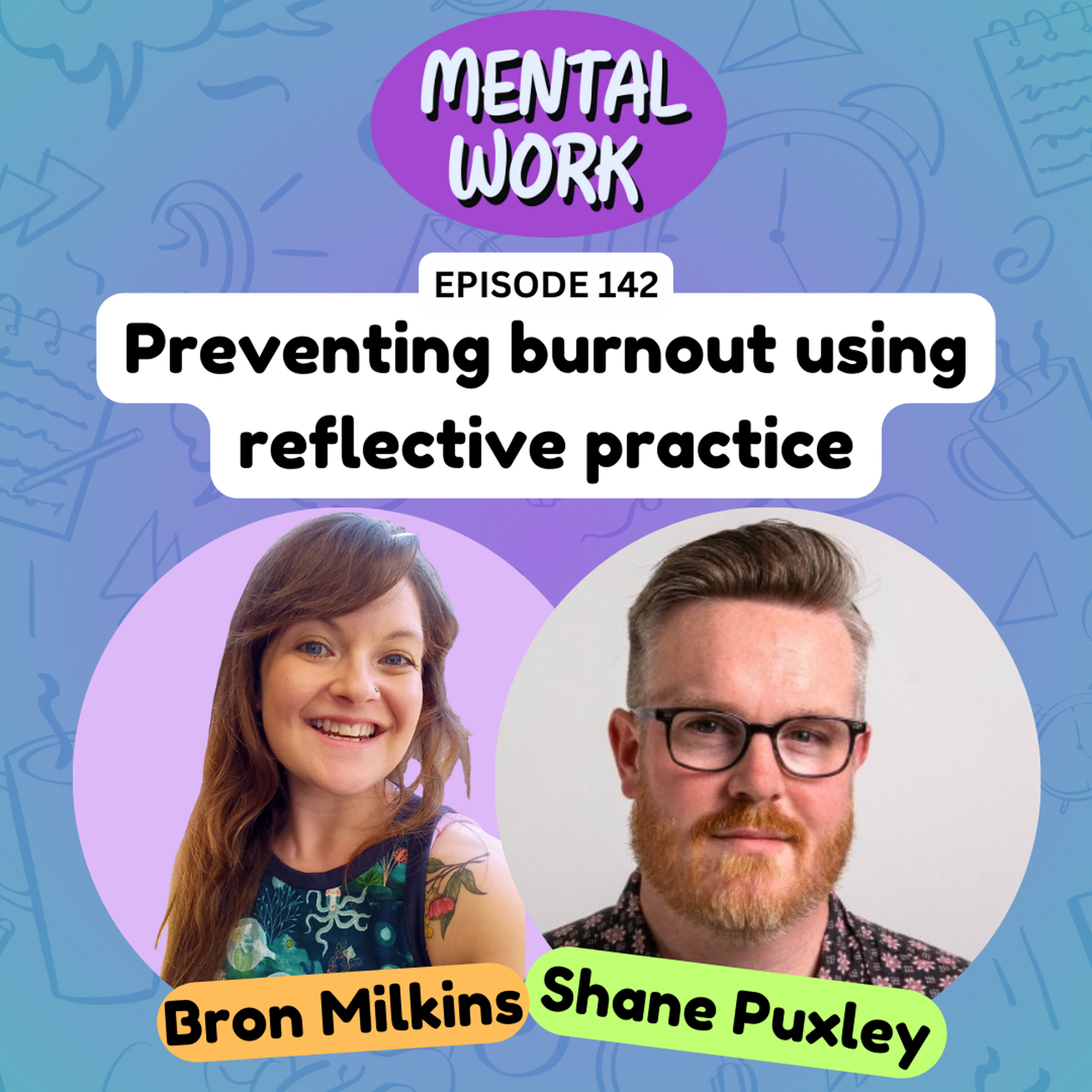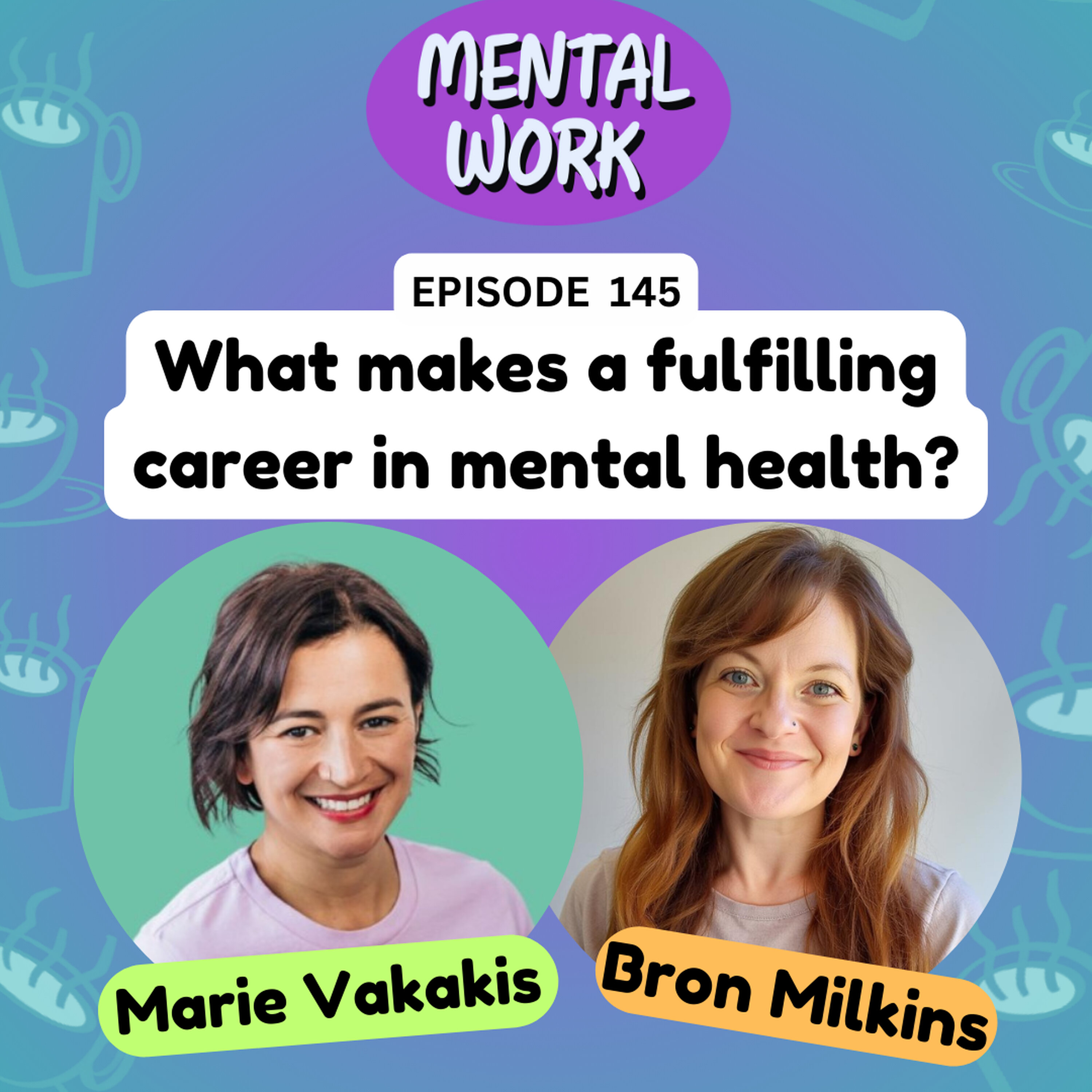Should psychologists be political?

Prompted by the upcoming Australian Federal election, in this solo ep Bron unpacks whether psychologists should speak up about political issues or remain politically neutral. Bron also walks through the AHPRA code of conduct, AHPRA social media guidelines, and other considerations for those who want to advocate for change. Tune in for a thought-provoking discussion on the intersection of psychology and politics!
LINKS
- Wells, R., & Behardian O'Doherty, S. (2020). "What is an activist-practitioner and should I be one?" [Magazine Article]
- Rahim, M., & Cooke, A. (2019). Should clinical psychologists be political? [Book Chapter]
- AHPRA Code of Conduct for Psychologists (effective from 1 December 2025)
- AHPRA social media guidance: "How to meet your obligations under the National Law"
- Haeny, A. M. (2014). Ethical Considerations for Psychologists Taking a Public Stance on Controversial Issues: The Balance Between Personal and Professional Life. Ethics & Behavior, 24(4), 265–278. https://doi.org/10.1080/10508422.2013.860030
- Nadal, K. L. (2017). “Let’s get in formation”: On becoming a psychologist–activist in the 21st century. American Psychologist, 72(9), 935–946. https://doi.org/10.1037/amp0000212
- Singh, A., Roberts, M. C., McKinney, W. S., Kelly, S., Ortega, A., Doyle, R., & Tampke, E. C. (2023). Advocacy as a professional competency in psychology. Training and Education in Professional Psychology, 17(4), 414–422. https://doi.org/10.1037/tep0000450
THE END BITS
Mental Work is the Australian podcast for mental health workers about working in mental health, with an early-career focus. Hosted by Bronwyn Milkins.
Support the show by buying me a virtual coffee ☕🍵
Have a question, episode idea or just want to say hi? DM Bron on Instagram or email mentalworkpodcast@gmail.com
Apply to be a guest / YouTube (with captions & transcript) / Website
CREDITS
Producer: Michael English
Music: Home
Disclaimer: Mental Work provides informational content. Mental Work is not a psychological service and being a listener or participant does not establish a clinical or non-clinical relationship. Content should not be considered a replacement for professional consultation or therapy. All views expressed are personal, subject to change, and do not represent those of any affiliated service or organisation. Efforts are made to ensure accuracy, but opinions may not always align with fact. Listeners are encouraged to thoughtfully assess the information presented and report any inaccuracies or concerns via email. Further information can be found here.
Commitment: Mental Work believes in an inclusive and diverse mental health workforce. We honor the strength, resilience, and invaluable contributions of mental health workers with lived experiences of mental illness, disability, neurodivergence, LGBTIQA+ identities, and diverse culture. We recognise our First Nations colleagues as Traditional Custodians of the land and pay respect to Elders past, present, and emerging. Mental Work is recorded on unceded Whadjuk Noongar land in Boorloo.
See omnystudio.com/listener for privacy information.
[00:00:05] Bronwyn: Hey, mental workers. You're listening to the Mental Work podcast, the podcast about working in mental health for early career mental health workers. As always, I'm your host, Bronwyn Milkins, and today we are talking about whether psychologists should be involved in political issues, and if they want to, what they can say and still meet their ethical and professional obligations.
[00:00:25] This episode was sparked by the upcoming Australian Federal election. Around election time. We tend to see a surge in public conversations about the systems and policies that shape people's lives, and it makes sense. Many psychologists care deeply about the social issues that directly impact our client's health and wellbeing. These are issues like poverty, discrimination, housing, and employment insecurity, but should we be involved, or maybe we should just be by the sidelines?
[00:00:54] In this solo episode, I'm going to try and provide a bit of clarity and start a conversation. I'm not promising to cover everything there is about this topic, but I am aiming to go through the major aspects for listeners who are not sure whether psychologists should be political and help listeners who wanna speak up about political issues but aren't sure what to say, have a bit more guidance in that area. I'm going to talk through the AHPRA code of conduct, the AHPRA guidance on social media and some peer reviewed articles in a book chapter I've found about psychologists and political advocacy.
[00:01:23] To start off, when I say politics, what am I talking about? Political issues are topics or problems that affect how society is run, and they often involve different opinions about what the government should do. Examples include healthcare, education, climate change, and immigration.
Is psychology political? Sould psychologists be involved in politics?
[00:01:39] Bronwyn: The first question I want to explore is whether psychology is political. My argument is that it's impossible to divorce psychology from politics. There's a few reasons for this. First, people's social circumstances have a huge impact on their mental health and wellbeing. So it's not just that distress is located within the individual and the individual has depression or anxiety, say, it's that people's social circumstances like unemployment have a profound impact on how well they are doing in terms of their mental health. Second, the opposite is true. So people who have mental health problems are more likely to live in poverty, be socially isolated and have poor physical health.
[00:02:18] Another reason why we can't divorce psychology from political issues is that there is still a lot of prejudice and discrimination in relation to mental health problems. So even though we've had huge awareness campaigns through organizations like Beyond Blue, if you ask somebody in the community about mental health issues, they might say, "I don't wanna associate with someone who has mental health issues". Or they might think that that person is to blame and they just need to do things to say, stop being depressed, and then they would feel better.
[00:02:45] It's easy to blame the media for reporting misinformation and perpetuating stereotypes about people with mental health. We can hardly blame lay people for reporting inaccurate information unless we as psychologists proactively provide them with more robust and nuanced alternatives. We have a whole literature that is dedicated to examining the stigma related to mental health conditions and a whole bunch of other social nuances, and we as psychologists, are perfectly placed to be able to educate the public and reduce that.
[00:03:15] And I think as educated psychologists, we know that a whole bunch of so-called mental health problems are actually normal responses to a lot of social problems that people live with and that they have to survive with on a daily basis. For example, when we think of people who don't have access to education, that might lead to low employment or unemployment, and so they may become depressed, anxious, or just live with a whole bunch of distress every day that impacts their ability to be well and form relationships. So we can educate the public about this.
[00:03:46] But one other thing that we do is that we focus on offering individual therapy mostly. We know that prevention is better than a cure, and we know that economically as well. So there's been tons of studies and reports and inquiries that have looked at, well, if we invest in prevention, what's the overall benefit cost wise to society? And I believe that a Price Waterhouse Cooper report a few years ago found that for every dollar you invest in mental health, you get a $1.50 back. So it's overwhelming return on investment to prevent mental health issues from occurring rather than treating them upstream.
[00:04:21] Given that we know all of this, why are we so reluctant to speak out and how can early career psychologists be part of a wider solution? I think one major reason why we are so reluctant to speak out about political issues is this idea that psychologists should be politically neutral.
[00:04:37] We can see that this might come from Freudian approaches to psychotherapy in that the analyst should be politically neutral, and that if you reveal anything about yourself, well then that can impact the client's capacity to be able to explore their own issues because then you're kind of interfering with that process.
[00:04:55] Just because we've had this foundation to psychological practice through these Freudian approaches, doesn't mean that we need to keep doing that. There's a lot of studies which find that responsible disclosure of personal information can have a beneficial impact on the therapeutic relationship. So maybe the ways that we've always done things doesn't have to be the way that we do them now.
[00:05:14] Furthermore, there is no ethical mandate to say that we should be politically neutral. In fact, there's usually the opposite. So when we look at ethical codes from other professions like nursing and social work, they're actually ethically mandated to stand up for social justice, social equality, and that takes the form of health equity, so equitable access to health services.
[00:05:37] I think another very valid reason why psychologists are fearful about speaking out about political issues is that they're fearful of the repercussions, and I think this is a legitimate concern. Unless you are self-employed, you are often very seriously constrained in what you can say and do in terms of political beliefs and activism. Essentially, if your political beliefs are not endorsed by your employer or advocacy is not viewed positively by them, then you're placing yourself at their mercy.
[00:06:01] As psychologists, you can decide what you'd like to do in this situation. You can absolutely speak up knowing the risks, or you can choose to get involved in safer ways like speaking to your professional association who can advocate on your behalf, that creates some distance, reducing the risk to you.
[00:06:16] Another reason why psychologists might be hesitant to get involved in political advocacy is their concerns about their own wellbeing, which I totally understand as well. So being involved in advocacy can involve exposure to people who are critical. For example, if you care a lot about decolonialization of psychology, it can mean engaging with people who might have racist beliefs and attitudes, and that can wear down on yourself.
[00:06:43] So deciding to get involved politically requires a certain degree of being able to take care of yourself in the face of conflicting, and sometimes personally repulsive views that people may have.
[00:06:54] Finally, a reason why psychologists might not be involved in politics is that we don't have any training on advocacy. So I found a few articles stating that advocacy should be a competency for psychologists, which I completely agree with because as I said, psychology just can't be divorced from politics. But if we're not getting the skills for how to do it, then we are not confident, we lack the knowledge and we don't know how to do it effectively. So anything that we do might not just be the most effective way to go about it.
[00:07:23] One thing I will say about the question of whether psychologists should be involved politically is the standard you walk by, is the standard you accept. I quite like that. I found this book chapter titled, Should Clinical Psychologists be Political? And the authors say that there are some who say that we can carry out this work and remain neutral, that as professionals we can simply do our jobs and avoid taking sides.
[00:07:46] But the authors say that in the current context, they don't believe that this is possible. They say that silence in the face of oppression puts us very much on the side of the oppressor. They say that we have privileged knowledge and as a result of our training and especially our daily conversations with our clients, we need to use that knowledge to critique harmful policies and to offer psychologically informed alternatives. I will link to the book that this came from and the authors are Masuma, Rahim and Ann Cook. I found myself nodding in agreement with this paragraph, and I've highlighted the whole thing.
[00:08:16] One article that I also read in preparation for this podcast episode was an article from a magazine titled The Activist Practitioner, and the article is titled, what is an Activist Practitioner and Why Should I Be One? It was written by Ruth Wells and Sarah O'Doherty, and the paragraph that stood out to me, is that when we work as activist practitioners, it asks us to stop and consider whose voice and whose knowledge is being silenced or amplified. So they say that a step is where we should stop and ask ourselves whether we wanna continue to silence those voices or do something different. And I really like that.
[00:08:52] I think something that psychologists can do, even if we don't say, write to our representatives or get involved in rallies or sign, petitions, is that in our work clinically, we can take a broader perspective on a person's presenting concerns that they bring to us. So rather than locating the distresses in the individual, we can extend their formulation to include cultural, historical, systemic, colonial, and other factors which may have an impact on the individual.
[00:09:21] One factor I remember incorporating quite early into my formulations was gender, because I worked with people who worked in hierarchical workplaces based on gender, and I found that if I didn't incorporate that into my formulation, I'd lose a lot of nuance about what this person was experiencing.
[00:09:37] But I think as psychologists, we can expand that like Sahra and Ruth say. To not suggesting that the problem is within the individual, but that the individual exists within a problematic system, and I think that provides a much nicer and less stigmatizing and non-judgmental way of approaching our clinical work.
How do I get involved?
[00:09:55] Bronwyn: Okay, so that is part one of the podcast episode where we're talking about should psychologists be involved in politics. And I hope I've just given you some food for thought. Let's talk about the situation that if you want to speak out.
[00:10:09] Just because you can speak out doesn't mean it's for everyone, and I really want to acknowledge that you're not any less of a practitioner if you're not involved in speaking up and out about political issues. Even myself, I would love to be involved more in advocacy but I don't have the time or mental space. Likewise, you're a busy person. We're all trying to manage burnout, and you might not be doing yourself or your clients any favors if you push yourself too far. You're already doing really important work on the ground with the people in front of you and, and that's perfectly acceptable.
[00:10:39] But let's say that you do wanna speak up about political issues. What can you say? Let's have a look at the AHPRA code of conduct for psychologists. So an advanced copy was released in November 2024, and it takes effect from 1st of December, 2025 and replaces the APS code of ethics. There's one key thing to remember when it comes to AHPRA is that AHPRA's main concern is public safety and the quality of health services. So when we think about public advocacy through an ethical lens, what we're really asking is could what I do impact clients could what I do impact their profession's reputation? And does what I do reflect the values and expected conduct of a psychologist?
[00:11:19] Here is the main section from the AHPRA Code of Conduct that relates to advocating publicly. It's section 8.4 titled Public Behavior and Statements, and this is what it says and I quote: "psychologists have an obligation to enhance and protect the profession's reputation by refraining from practice and personal behavior that might bring the profession into disrepute or reflect poorly on their ability to practice. Psychologists should also recognize that statements intended to be private may become public and could impact how the profession is perceived. When making public statements including on social media, professional behavior includes using respectful language, respecting others' privacy and maintaining boundaries. It also includes making formed comments based on contemporary peer reviewed research or demonstrated expertise."
[00:12:06] Here is the key nuance to keep in mind when you were thinking of speaking up and out about political issues. Advocacy isn't the same as providing a psychological service according to AHPRA a psychological services when you apply your knowledge, skills, or experience in psychology and in a professional capacity, so that might involve assessment, intervention, consultation, supervision, or using your psychological expertise in any work related context.
[00:12:32] So when you do advocacy and you speak publicly as a psychologist, you might think that you're not providing a psychological service, and that's true. The issue is, is that you're often seen as a psychologist, and that means that the code still applies. So even if you publish an opinion piece in the Guardian on say, climate change, your name is still going to be attached to your registration. I just think it's inherently difficult to separate the two, especially in the public's eyes and in the profession's eyes, and that's ultimately what matters. You can argue one way, but the perception is still going to be there. So that means you need to abide by what's expected of you as a professional.
[00:13:11] These are things that we should be doing anyway, like we shouldn't be making uninformed comments. We should always be using contemporary peer reviewed research, and we should always be respecting people and using respectful language. So it's less about me encouraging you to stay silent and more about speaking in ways that uphold our responsibilities to the public.
[00:13:30] Let's move on to AHPRA's guidance for social media. So let's say you wanna speak up about political issues, and the main way that you wanna do that is through social media. AHPRA, have a handy page, which is titled How to Meet Your Obligations Under the National Law, and let's go through some key takeaways.
[00:13:46] The first thing is, is that we don't want to post anything that might compromise cultural safety or make clients slash the public feel judged, intimidated, or embarrassed. We don't want to even like or upvote or share disinformation or misinformation. We don't want to publicly comment on grievances with colleagues or clients that should be handled privately.
[00:14:07] One other thing that we shouldn't do in social media is assume that a private group is truly private. Don't make that mistake. Anything can be screenshot, anything can be shared. And I know of AHPRA cases where people have posted things on social media, in private groups, and they've had complaints made about them.
[00:14:23] Another key thing is to never breach client confidentiality ever. I see a lot of social media posts, more than I should, where people try and de-identify client cases and they talk about them at length, and it's quite an engaging story. But I know myself, if I was a client, I would not want my therapist posting about me even in a de-identified way. So AHPRA are very strict about this as well, and they should be because client confidentiality is extremely important. So don't do that.
[00:14:53] There are two kinds of social media activity that may trigger an AHPRA investigation, and this is according to the Medical Republic, which is an online news site written by journalists and medical practitioners who are interested in social advocacy, and they say that these two kinds of social media activity, are firstly political content calling for inappropriate action. So for example, protests aimed at denigrating a populational group, or content that is deliberately misleading and could incite racial hatred or intolerance. So I would say any other forms of hatred towards a particular group of people.
[00:15:27] If you're considering social media as a key platform for you in social advocacy, I'd recommend having a supervision session outlining every ethical concern that you can think of and your response to and how you're going to manage it.
[00:15:40] One last thing on social media is that there's a pressure to respond and generate content really fast. I can see this being an ethical trap, particularly for early career folks, but we have a 24 hour news cycle, and you may feel pressure to wanna post something right now, or you might miss your moment.
[00:15:59] But quick posting skips a vital step, which is reflection. So I would encourage you before hitting publish, to ask yourself, is this within my scope of practice? Do I actually know about this? Am I basing what I'm posting on the evidence, on the acceptable evidence as well? And is it something that I know about? Could what I'm posting create a conflict of interest? Am I risking a confidentiality breach? Because once it's online, it's hard to walk back. Somebody can screenshot it straight away. Someone can respond, someone can send it to your employer.
[00:16:28] So take your time, draft a response, sit with it, and if it's complex, get feedback from a colleague or supervisor. You don't have to be fast, but as a psychologist, you do have to be thoughtful in what you're doing.
[00:16:39] So let me give you an example of something that you might like to advocate for. So I live with PMDD, which is Premenstrual Dysphoric disorder. It really affects my quality of life and certain medications have been a game changer for me, but they're not currently covered under the Pharmaceutical Benefits Scheme in Australia, which makes medications cheaper and accessible.
[00:17:00] So I might want to advocate for these medications to be listed through a petition, a media interview, or even here on the podcast. Ethically, that's a valid advocacy, there's no issues. It's a health issue, it's a health equity issue that people should be able to access the treatments that they need to manage their medical conditions.
[00:17:18] But here's a few things I might wanna consider. I should be clear that I'm speaking from personal experience, that I'm not generalizing to all people who experience PMDD and that I'm certainly not giving medical advice because even though PMDD is technically a psychiatric disorder, it also involves taking medication so somebody could perceive me as stepping outside my competence to be recommending or giving advice on medications. I certainly wouldn't name the medication that I use because everybody's medication needs different.
[00:17:48] I should also consider boundaries. Could oversharing affect my privacy or my wellbeing? I've considered this, I feel comfortable with it, but what are the long term potential ramifications?
[00:17:58] Another thing that I have to consider is stigma. So will this impact our clients or colleagues view me. So if it affects how clients view me, we always need to be prepared as psychologists to be able to have conversations about clients, about things they find out about us, essentially. Rather than hoping that it won't turn up in sessions, you should be prepared in advance what would happen and what would you respond to the client. If they say, Hey, I listened to this, or I found out about this, and it makes me, makes me question things. It makes me change my viewpoint on you. We need to be able to have that conversation with them.
[00:18:33] The last thing is that I'd wanna frame the issue through evidence. So I'd wanna say something like, research supports these medications for PMDD, which is absolutely true, and I would save the articles, which I have, which absolutely back that up, but cost remains a barrier due to the absence on the PBS.
[00:18:52] Framing it through evidence is completely in line with what we do as psychologists, and it's the standard that AHPRA expects of us. So this moves the focus from my own personal frustration to systemic change and keeps the advocacy grounded and ethical.
[00:19:06] So let's do a final checklist of things you need to consider if you wanna speak up about political issues as a psychologist. So despite the fact that the ethics code does not apply to the personal lives of psychologists, behavior in our personal time could still have detrimental impacts on our professional relationships and the public. Furthermore, even if we try and divorce being a psychologist from us personally, the public could still see us as a psychologist and we might only be able to say, publish an opinion and piece in The Guardian because of our role as a psychologist. So that means that we still need to uphold the ethical standards and responsibilities that we do have.
[00:19:44] It's really essential that you keep this in mind when out in the community, especially if taking a public position on a social or political issue. So if you're ever thinking about speaking publicly, I would encourage you to do it. But stick with evidence-based claims. Speak within your scope. Don't speak about things you don't know about. Be mindful of confidentiality, clarify whether you're speaking personally or professionally. Watch for conflicts of interest. Maintain professionalism and take your time if needed. Run your message by someone you trust and have a plan for how to talk to clients about your political advocacy. If it's something they bring up with you in therapy, it's not a, if it happens, it's a when it happens.
[00:20:22] Finally, I would love to leave you with a call to action if you take nothing else away from this episode I would really love to encourage listeners to engage with your professional association of choice, because I think that together we can make a key difference. We know in Australia that the amount of funding in mental health is way below where it should be relative to the amount of people who experience mental ill health, their families, their communities, and the impact that it has on their lives. So we need to be actively working to put mental health on the political agenda and all the issues that are related to mental health. So that's employment, education, health equity. It's really important.
[00:21:00] A good association will advocate for all of psychology, all of mental health, and putting psychology on the national agenda. And I think it reduces your personal risk quite a lot because of that buffer between you, the association and the political representatives.
[00:21:15] If your professional association is not doing enough then it might be time to switch. Listeners might know that I'm a member of the Australian Association of Psychologists and I'm really happy with what they do politics wise, but you might be happy with your professional association, particularly if you're not a psychologist as well.
[00:21:32] And I just wanna reiterate that just because we can speak about political issues doesn't mean that you're any less of a mental health professional if you don't. I completely understand that you may not have the time capacity. Your life is full with other things that prevent you from being able to take more tangible steps in this area. I think if you don't have the capacity to do that, being aware of how social issues like cultural, historical, colonial systems can impact your clients, can be a huge step forward and you will be a better practitioner because of it and be advocating with your clients in that way.
[00:22:07] So there you have it. Speaking out is absolutely possible as a psychologist, but doing it well means being intentional, clear, and ethically grounded. I'll put everything that I talked about and referred to in this episode in the show notes that you can have a look at it and refer back to it later, and I'd be interested to hear what you think. You can always contact me by Instagram, is the best social media or email, which is mentalworkpodcast@gmail.com, and feel free to comment on the posts. I'm very keen to hear what you thought, whether you think that we can divorce our personal and political lives and any other aspect of this episode that stood out to you.
[00:22:44] Thanks for tuning into Mental Work. If you found this helpful, do share it with a colleague and let me know what topic you'd love for me to cover next. Until next time, take care and have a good one. Bye.




